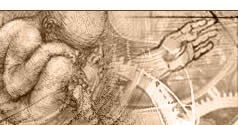 |
 |
 |
 |
 |
 |
 |
 |
|
 |
 |
 |
70 Causal evolutionary research
|
| Menu | back |
Causal evolutionary research has an insurmountable problem with its proof: It is necessary for it to prove chance development according to its own theory, based on experience (description of calculable and predictable sequences), the alleged long periods (during which macro evolutionary developments are to have taken place) and unsubstantiated claims (such as that evolution is directional, however not goal-oriented), protect the theory against falsification.
Exactly the same data is available to proponents and opponents of the theory of evolution. The basics for the specific interpretation of the data available are the same for both. They do not extent beyond current observations or current experiments as well as the current proof of experience (causalities, principles). The past, by contrast, can be reconstructed experimentally, but only to a very limited extent.
Historical and causal evolutionary research:
So-called historical evolutionary research in the areas of comparative biology and fossil research is based solely on the data available today about the remains of dead organisms, including fossils.
Causal evolutionary research, with the areas of speciation through so-called evolution factors (mutation and selection) as well as molecular evolutionary research, attempts to prove the current experience or principles of development based on current data.
This requires that historical evolutionary research interprets present facts to the past while in the case of causal evolutionary research, experience gained today is extrapolated into the past!
When experience is transferred into the past, as well as in the case of retro-interpretation of fossils, the specific conviction plays a decisive role! Observation and belief are mixed inevitably. Since individual pieces of data (e.g., the appearance of a single fossil) and individual experience do not provide a correct picture of the past, it is necessary to collect more data and experience to obtain a correct picture of the past.
Since the data are actual as well as innumerable and the experience is actual as well as extremely complex, their combination to form even an approximately consistent, unambiguous, and coherent theory without the guidelines of a predetermined concept is not possible. The conception of the past therefore develops inevitably from the combination of observation and belief or the combination of the methods of induction and deduction (derivation of general phenomena from individual phenomena and vice versa).
The problem of proof:
It is only possible to prove actual and unchanged facts and experience by empiricism. Since a current factual proof for the origin and development of matter and life in the past is totally absent, proof is possible only indirectly through actual experience assuming the same conditions as in the past. Empirical propositions just as all physical laws are characterized by calculable, predictable, precisely defined actual sequences.
A causal evolutionary research therefore has an insurmountable problem with proof. It is necessary for them to prove development by chance, i.e., incalculable and unpredictable development, based on calculable and predictable processes, according to their own theory. This is impossible!
The chance factor makes empirical research on macro evolution, i.e., the common origin and advancement of living creatures, impossible at the very beginning!
Conclusion (1) :
Since chance developments cannot be proven with experience sought with causal evolutionary research, only historical evolutionary research such as palaeontology is suitable for proving the alleged macro evolution. Hereby it is supported by geology and, to a limited extent, archaeology, for establishing a chronological relationship to the dating of the rocks containing fossils. There exists a danger of mutual influence of interpretation of the facts. Historical evolutionary research is not an empirical science.
These 71 | Menu |
back
|
Reference:
|
| (1) |
Dieter Aebi, Prozessakte Evolution, Evolution contra Kreation aus juristischer Sicht, Dillenburg 2006, page 9. | |
| |
Comment this Site!
|
 |
 |
 |
 |
|

